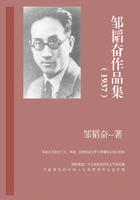Moreover, like other Frenchmen, they have been brought up in the philosophy of the eighteenth century. "Liberty is so precious,"wrote the Duc de Brissac,[6] "that it may well be purchased with some suffering; a destroyed feudalism will not prevent the good and the true from being respected and loved." - They persist in this illusion for a long time and remain optimists. As they feel kindly towards the people, they cannot comprehend that the people should entertain other sentiments toward them; they firmly believe that the troubles are transient. Immediately on the proclamation of the Constitution they return in crowds from Spain, Belgium, and Germany;at Troyes there are not enough post-horses for many days to supply the emigrants who are coming back.[7] Thus they accept not only the abolition of feudalism with civil equality, but also political equality and numerical sovereignty.
Some consideration for them, some outward signs of respect, a few bows, would, in all probability, have rallied them sincerely to democratic institutions. They would soon consent to be confounded with the crowd, to submit to the common level, and to live as private individuals. Had they been treated like the bourgeois or the peasant, their neighbors, had their property and persons been respected, they might have accepted the new régime without any bitterness of feeling. That the leading emigrant nobles and those forming a part of the old court carry on intrigues at Coblentz or at Turin is natural, since they have lost everything: authority, places, pensions, sinecures, pleasures, and the rest. But, to the gentry and inferior nobles of the provinces, chevaliers of Saint-Louis, subaltern officers and resident proprietors, the loss is insignificant. The law has suppressed one-half of their seignorial dues; but by virtue of the same law their lands are no longer burdened with tithes. Popular elections will not provide them with places, but they did not enjoy them under the arbitrary ministerial rule. Little does it matter to them that power, whether ministerial or popular, has changed hands: they are not accustomed to its favors, and will pursue their ordinary avocations - the chase, promenading, reading, visiting, and conversing - provided they, like the first-comer, the grocer at the corner, or their farm-servant, find protection, safety, and security on the public road and in their dwellings.[8]
II.
Workings of the popular imagination with respect to them. - The monomania of suspicion. - The nobles distrusted and treated as enemies. - Situation of a gentleman on his domain. - M. de.
BussyPopular passion, unfortunately, is a blind power, and, for lack of enlightenment, suffers itself to be guided by spectral illusions.
Imaginary conceptions work, and work in conformity with the structure of the excited brain which has given birth to them:
What if the Ancient Regime should return!
What if we were obliged to restore the property of the clergy!
What if we should be again forced to pay the salt tax, the excise, the taille, and other dues which, thanks to the law, we no longer pay, besides other taxes and dues that we do not pay in spite of the law!
What if all the nobles whose chateaux are burnt, and who have given rent acquittances at the point of the sword, should find some way to avenge themselves and recover their former privileges!
Undoubtedly they brood over these things, make agreements amongst each other, and plot with the strangers; at the first opportunity they will fall upon us: we must watch them, repress them, and, if needs be, destroy them. - This instinctive process of reasoning prevailed from the outset, and, in proportion as excesses increase, prevails to a much greater extent. The noble is ever the past, present, and future creditor, or, at the very least, a possible one, which means that he is the worst and most odious of enemies. All his ways are suspicious, even when he is doing nothing; whatever he may do it is with a view of arming himself.
M. de Gilliers, who lives with his wife and sister one league out of Romans in Dauphiny,[9] amuses himself by planting trees and flowers;a few steps from his house, on another domain, M. de Montchorel, an old soldier, and M. Osmond, an old lawyer from Paris, with their wives and children, occupy their leisure hours in somewhat the same manner. M. de Gilliers having ordered and received wooden water-pipes, the report spreads that they are cannon. His guest, M.
Servan, receives an English traveling-trunk, which is said to be full of pistols. When M. Osmond and M. Servan stroll about the country with pencils and drawing-paper, it is averred that they are preparing topographical plans for the Spaniards and Savoyards. The four carriages belonging to the two families go to Romans to fetch some guests: instead of four there are nineteen, and they are sent for aristocrats who are coming to hide away in underground passages.















